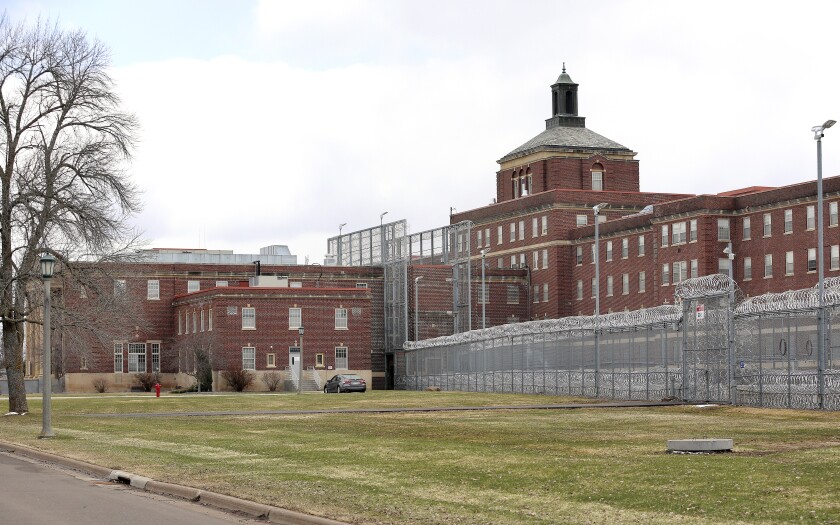ST. PAUL — A transgender inmate in a Minnesota men's prison will transfer to a women's prison as part of a lawsuit settlement with the state corrections department, her legal team and state officials announced Thursday, June 1.
The transfer will be a first for Minnesota prisons.
ADVERTISEMENT
Christina Lusk, a 57-year-old serving a sentence for drug possession at the Minnesota Correctional Facility–Moose Lake, sued the Minnesota Department of Corrections in 2022 for failing to accommodate her needs as a transgender woman by placing her in a men's facility and denying gender-affirming surgery.
Under the settlement agreement announced Thursday, Minnesota will transfer Lusk to the women's prison in Shakopee, pay her $495,000 in legal fees and damages, and reconnect her with gender-affirming treatments and counseling, according to legal advocacy group Gender Justice, which brought the lawsuit on Lusk's behalf. The corrections department also agreed to change its policies surrounding transgender inmates.

“With this settlement, the Department of Corrections takes an important and necessary step toward fulfilling its responsibilities to the people in its care,” Gender Justice Legal Director Jess Braverman said in a news release. “Thanks to Christina Lusk’s willingness to speak out, transgender people in custody will now have expanded access to the housing and health care they need, and the legal protections they deserve.”
According to the lawsuit brought by Gender Justice, Lusk is “socially, medically, and legally” female but was not recognized as such by the Minnesota Department of Corrections. Despite the state of Minnesota recognizing Lusk as a woman, the state corrections department placed her in a men’s prison, exposing her to discrimination and harassment, the lawsuit said. Officials declined Lusk’s request to be placed at the women’s prison in Shakopee, a decision Gender Justice said the corrections department made based on genitalia rather than legal or medical criteria.
Lusk was designated male at birth, and started hormone replacement therapy after coming out as transgender in 2008, according to the lawsuit. She changed her name in 2018 and was consulting with doctors about gender-affirming surgery around the time of her 2019 arrest.
The corrections department's transgender committee recommended Lusk be placed at Moose Lake in single-cell or dormitory housing and be able to shower alone. At certain points, she was housed with as many as seven men, the lawsuit said. She filed a complaint with the Minnesota Department of Human Rights in 2020.
While incarcerated, Lusk has sought gender-affirming surgery but corrections officials denied her request to receive it while incarcerated, despite the fact that doctors had approved her for the procedure before she went to prison, according to the lawsuit. Lusk is set to be released in 2024. The corrections department's decision on where to hold Lusk and denying her gender-affirming surgery was unconstitutional and violated the Minnesota Human Rights Act, Gender Justice argued.
ADVERTISEMENT
Now the state prison system will provide Lusk with access to a transgender health care specialist who will determine if surgery is necessary, and will help her obtain it.
“The DOC is constitutionally obligated to provide medically necessary care for incarcerated people, which includes treatment for gender dysphoria,” Corrections Commissioner Paul Schnell said in a statement. “Based on the facts of this specific case, the incarcerated person will now have access to the medical care she needs, she deserves, and we have a legal obligation to provide.”
Lusk called the resolution to the case "appropriate" and called for the public to embrace "positive change."
“I believe we have made a big step toward allowing people to express who they truly are, and bring some sort of peace and happiness to their lives," Lusk said in a statement distributed in a news release. "This journey has brought extreme challenges, and I have endured so much. My hope is that nobody has to go through the same set of circumstances."
The Minnesota Department of Corrections in January adopted a new set of guidelines for transgender inmates, which allowed transfers to facilities aligning with an inmate's gender identity. It also created a "Gender Identity Committee" at each facility to handle requests like single-cell assignments and showering arrangements.
Of the 8,000 or so incarcerated in Minnesota prisons, 48 are transgender, according to the Minnesota Department of Corrections. Ten other states and Washington, D.C., also allow for transgender inmates to transfer to facilities that align with their gender identity.
Follow Alex Derosier on Twitter or email aderosier@forumcomm.com .

























